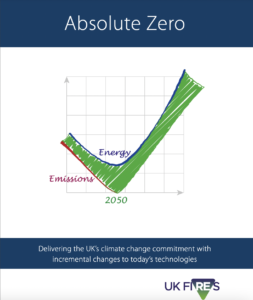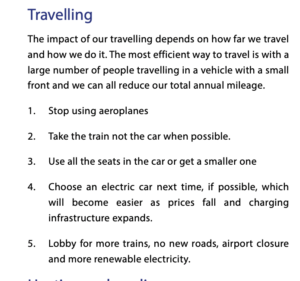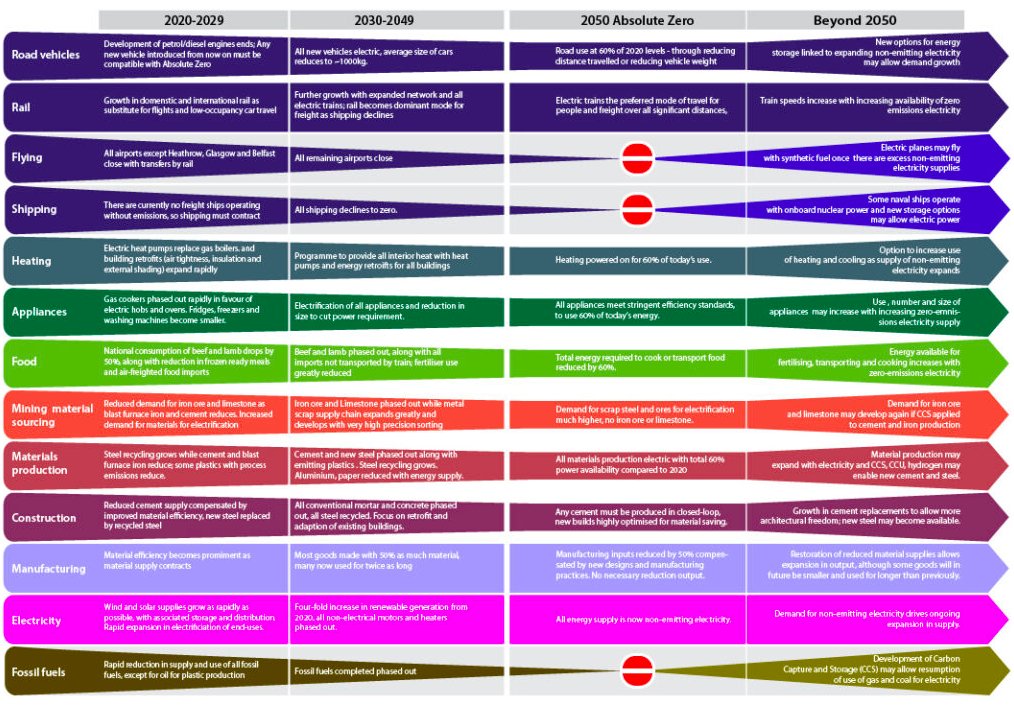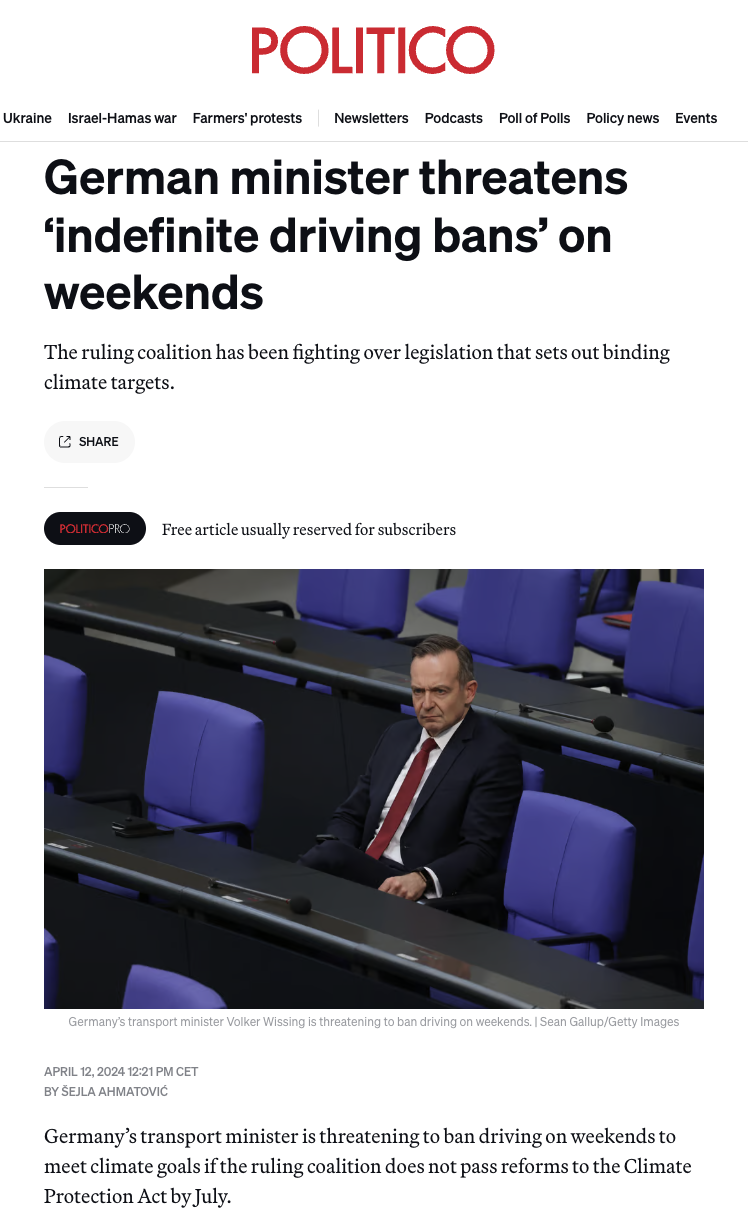“A disturbing future plan by 5 Universities funded by EPSRC.” They want to close airports, remove our gas appliances (fire, boiler, hob), shipping -disturbing future plan by 5 Universities funded by EPSRC: (UK’s Engineering and Physical Sciences Research Council)”
The full Absolute Zero report available here:
Absolute Zero’s Executive Summary and key points: “We have to cut our greenhouse gas emissions to zero by 2050: that’s what climate scientists tell us, it’s what social protesters are asking for and it’s now the law in the UK. But we aren’t on track.”
Report says climate change “requires a public discussion about future lifestyles.”
“The effective price of carbon must be prohibitively large by 2050. A key issue for how to implement this is the timeline for how the price must grow (or restrictions must become more strict) from now to 2050.”
“Although there are lots of new ideas about electric planes, they won’t be operating at commercial scales within 30 years, so zero emissions means that for some period, we’ll all stop using aeroplanes.”
Page 39: “Ensuring carbon is at zero is a regulation issue, with prohibitions on the use of carbon similar to prohibitions on the use of asbestos.”
“In addition, obeying the law of our Climate Change Act requires that we stop doing anything that causes emissions regardless of its energy source. This requires that we stop eating beef and lamb – ruminants who release methane as they digest grass – and already many people have started to switch to more vegetarian diets.”
“But until we face up to the fact that breakthrough technologies won’t arrive fast enough, we can’t even begin having the right discussion.”
Urges “growth in new zero emissions diets”
“This report sets an agenda for a long-overdue public conversation across the whole of UK society about how we really want to achieve Absolute Zero within thirty years.”
Key Messages for individuals: “The big actions are: travel less distance, travel by train or in small (or full) electric cars and stop flying; use the heating less and electrify the boiler when next upgrading; lobby for construction with half the material for twice as long; stop eating beef and lamb. Each action we take to reduce emissions, at home or at work, creates a positive ripple effect.”
“In addition to reducing our energy demand, delivering zero emissions with today’s technologies requires the phasing out of flying, shipping, lamb and beef, blast-furnace steel and cement.”
#
UK FIRES is a major research program, comprising a consortium of subscribing industrial partners from resource-intensive sectors working with academics from Cambridge, Imperial College, Oxford, Bath, Nottingham and Strathclyde who are funded from 2019-2024 by a £5m program grant from the EPSRC.
Absolute Zero Report: The Absolute Zero Report was published in November 2019 by UK FIRES, a group of academics from six major UK universities funded by the Engineering and Physical Sciences Research Council (“EPSRC”). … “It is firmly rooted in science but is also governed by a practical approach to incremental change and the need of all of us to address the need to approach the challenge of achieving Absolute Zero together as a society, based on technologies that are available now.”
#
The Ecologist Reviews Absolute Zero report:
Gareth Dale | 24th March 2020: The Ecologist’s Gareth Dale: “The UK government is committed by law to reducing greenhouse gas emissions to ‘net zero’ by 2050. In late 2019, a team of researchers at the Universities of Cambridge, Oxford, Nottingham, Bath and Imperial College London, published the Absolute Zero report. It aims to show how the UK can deliver on its climate change commitment, as laid down in The Climate Change Act of 2008 and its amendment of 2019.
“In calling for wholesale reduction in most economic sectors, and radical economic deglobalisation (end of aviation, end of shipping), it – and the Climate Change Act itself if it generates serious and consistent policy changes on the lines you propose – will bring forth tremendous opposition, even hostility, from capitalists, from the business community.”
“Your report recommends a radical transformation to the way we live. All shipping must be phased out by 2050, and likewise all use of cement-based mortar or concrete. In Britain, all airports except Heathrow and Glasgow will have to close by 2029, and those two by 2049. Aviation must become illegal by then, and, as the report states, ensuring that carbon is at zero must become “a regulation issue, with prohibitions on the use of carbon similar to prohibitions on the use of asbestos.”
…
Report’s lead author, Julian Allwood, Professor of Engineering and the Environment at the University of Cambridge: “Our problem isn’t to produce just one of any new technology. It’s to replace the entire existing global deployment of existing energy systems with alternative technologies.” …
“The sunset industries like aviation, fossil fuels, cement, blast furnace steel, are of course going to oppose it because they have to shut, but we just have to face up to that, and make sure that their voice isn’t given undue attention.” …
“The idea of all these technologies that might save us from modifying our behaviour has been around for at least 20 years. If you look back at the 2001 International Energy Agency’s World Energy Outlook they are all listed there. But they are still, today, operating at tiny scale, if at all.”
#
Absolute Zero: House of Lords debates report that stretches the imagination
By Patrick Lavery – Feb. 2020
The House of Lords (the upper house of the UK’s Parliament) last week began debate on a report by UK FIRES, a government-sponsored research collaboration of engineering and economics academics across the UK, which argues that technologies such as carbon capture, utilisation and storage (CCUS), and hydrogen as an energy vector will take too long to be deployed to aid the UK’s goal of net-zero greenhouse gas emissions by 2050. Published in November last year, the ‘Absolute Zero’ report takes as its basis the assumption that because there are currently few proven technologies to take significant amounts of greenhouse gases from the atmosphere, the UK’s target of net-zero emissions by 2050 is in fact a target for ‘absolute-zero’ (or ‘gross-zero’) emissions: “obeying the law of our Climate Change Act requires that we stop doing anything that causes [greenhouse gas] emissions regardless of its energy source”.
…
One does not need to read far into the report to discover just what a different UK the authors are suggesting. A striking early example comes in the executive summary, where it is stated that although “there are lots of new ideas about electric planes, they won’t be operating at commercial scales within 30 years, so zero emissions means that for some period, we’ll all stop using aeroplanes.” (Shipping, too, is to stop by 2050.) Given that in 2018, more Britons travelled abroad by plane than any other nation, this is quite a statement, yet the way it is written conveys an impression of straightforwardness. This attitude is reinforced during the discussion of transitions, in which the report states that the behavioural changes “required to deliver zero emissions by 2050 are already being practised by some people in some places: some people already choose not to fly, to be vegan, to car share, to lower the temperatures in their homes and offices. If large scale social amplification could occur, as it did with the ‘Me Too’ movement, surely a cultural change could occur to enable zero emissions by 2050?”
Also this is a disturbing future plan by 5 Universities funded by EPSRC:https://t.co/qQCXGa3ghD
Just look at the infographic – they want to close airports, remove our gas appliances (fire, boiler, hob), shipping – They are absolutely off their trolleys! pic.twitter.com/0P5HXDcUSs— 🌞Stargrazzer™🌱❄️☯PleasFollow0.04%TruerCO₂Story🌳 (@stargrazzer) June 22, 2021
Absolute Zero debated in the House of Lords – 6th February 2020
Climate Change
Volume 801: debated on Thursday 6 February 2020
Lord Browne of Ladyton: “Apart from the fact that Absolute Zero is the most accessible reading on this subject that I have come across, this report is important in three respects. First, net zero is a misleading concept. The true target is absolute or real zero. There are no significant technologies to create negative emissions. No matter how you choose to do it, it takes more energy to take the carbon out of the atmosphere than we gained when we put it there in the first place…We are beyond the 11th hour on this issue and academics are screaming for the Government to show more leadership in this regard.”
Baroness Walmsley: “The Climate Change Act commits us only to “net zero” within the UK territory. That will not do. We need absolute zero and we must count all the emissions for which we are responsible.”
The Earl of Caithness: “So far as the UK is concerned, it is worth noting that our cattle numbers in England and Wales are about the same today as they were in 1932. In 1974 they were about 56% higher in the UK than they are now. So far as sheep are concerned, we graze about the same number of sheep in England and Wales now as in 1868. Sheep numbers are well down from their 1992 peak.”
Lord Lipsey: “I do not find it helpful in selling this prospectus to people in the future. I think it sounds too scary. It is not the case that if we go above zero, there will be Armageddon…I am not a denier at all; I strongly believe in dealing with climate change. But if we were to put this report before the British people, it would be received in much same way as was the Labour manifesto: ‘Oh, you cannot be serious.'”
#
Related:
Click to access Absolute-Zero-online.pdf






